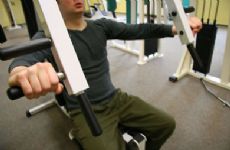|
I thought I knew a thing or two about diet and exercise. For example, I knew how to do a squat, and that avoiding carbs altogether wasn’t necessarily a wise thing to do. Then I enrolled in personal training school and realized just how much I didn’t know. To be perfectly honest, I had never really given any thought to the subject of exercise safety – and it took getting a formal education to bring it to my awareness. When you want to lose weight and get in shape, you focus on the important things: what foods to eat, which fitness program to follow and how to balance your calories in vs. calories out. Of course these factors are normal and helpful, but when it comes to exercise—an activity designed to bring you optimal health and well-being—there are hidden dangers lurking beneath the surface if you aren't paying attention. One of those hidden dangers is the act of chewing gum during exercise. When you work out, you breathe harder, heavier and faster than normal—and often through the mouth. If you are engaging in high-intensity exercises, as many of the popular weight-loss programs have been promoting within the last couple of years, then there is a pretty good chance that you are breathing quite heavily during your workout. Now imagine that you are exercising with a piece of gum in your mouth and suddenly, without warning, it gets lodged in your throat and you begin to choke. Would you be able to do something about this? If you were alone, the chances are pretty slim. If you were at a fitness facility, you would have to depend on the gym staff to know how to administer the appropriate protocol to try to save your life. I know it isn’t a pleasant thought, and I’m not trying to scare you. But since many of the gyms out there don’t necessarily require their staff to know the lifesaving techniques required to remove this foreign object that is blocking your airway, you may or may not survive the incident. And if you were lucky enough to have someone around who knew how to perform the abdominal thrusts in an effort to remove the objects that people normally choke on (such as food or candy), it’s important to understand that choking on gum is an entirely different situation. Since gum is flexible in texture, it tends to mold itself to fit perfectly in the airway once it gets stuck. This means that not only is it more challenging to expel gum even if the correct technique is applied by a qualified rescuer, but that there really are no guarantees that it will work. And the longer the gum remains stuck in the airway, the longer the brain is deprived of oxygen, the effects of which can range from mild to severe. So if you do happen to survive the incident, you may or may not have lasting consequences to deal with, such as brain damage, reduced cognitive abilities or memory and problems with attention span. This is a risk you can easily avoid. The truth is: If someone is capable of choking on his or her food while calmly sitting and dining (and this happens frequently), then it’s definitely possible that it can happen during exercise. I cannot tell you how often this habit is overlooked, which is why I am bringing it to your attention. I certainly didn’t know, and would have remained unaware if it hadn’t been intentionally brought up one evening in class. In fact, during this particular lecture on the dangers of chewing gum while exercising, Dr. Abbott (the president and chief instructor of the school) informed us that while discussing this topic in the past, three of his students admitted to having witnessed someone choke on their gum while working out in the gym--and all three died. If you happen to like having something around to help cope with the effects of a dry mouth that exercise sometimes causes, then a helpful suggestion is to keep some cold and refreshing lemon water around while you work out, and then enjoy your gum after your workout once your breathing has returned to normal. Considering that this isn’t a common topic of discussion, I felt it was my responsibility to make sure that others had access to this lifesaving advice as well. So given that healthy-living is the overall goal, doesn’t it make sense to be well informed about the possible hidden risks of your fitness program? I think so. The knowledge that makes it possible to make wise, informed and deliberate decisions in an effort to live our best lives is a precious gift. Are you guilty of chewing gum during your workouts? Have you ever had a close call because of it?  About The Author About The AuthorCreator of IChooseAwareness.com and author of the book "A Simple Guide to Exercise Safety: What You Don't Know CAN Hurt You," Dana Gore completed the curriculum at Fitness Institute International, Inc. as an outstanding graduate in 2009. Dana brings guidance to the public about how to achieve optimal health in a safe and structured manner. She believes that the body follows the guidance and instruction of the mind and spirit while inspiring her readers to seek self-awareness and inner peace as a means to well-being in all areas of life. |
Related Entries
More From SparkPeople |





















.png)